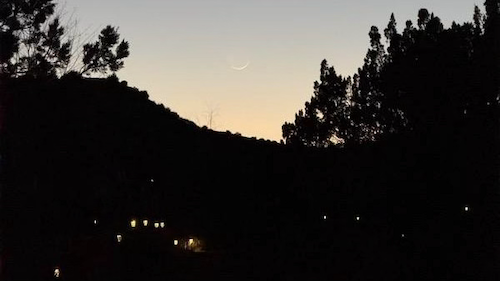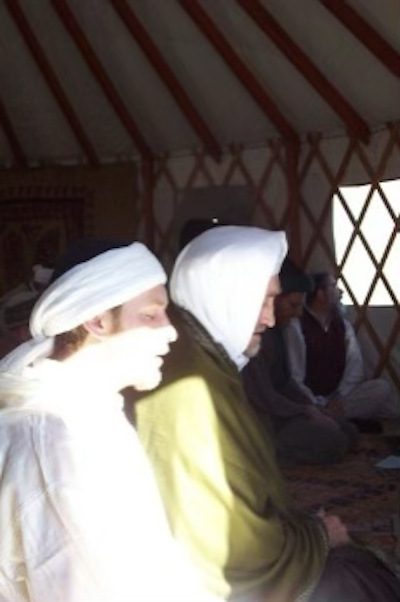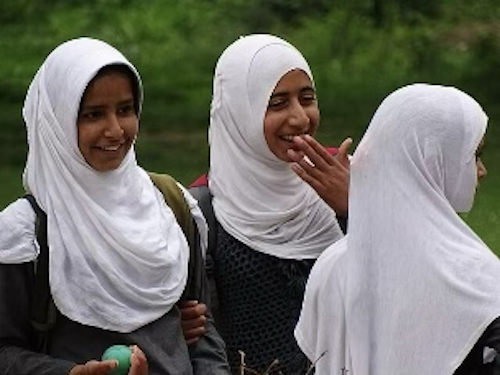|
By Karima Alavi This Friday we’re taking a slight detour from my stories about the early days of Dar al Islam, the mosque and madressah (retreat and educational facility) in Abiquiu, New Mexico. We are currently a bit beyond the midway point of the month of Ramadan, a time of increased religious focus and fasting. There is, however, much more to the month than simply fasting from right before sunrise to immediately after sunset. Because fasting is directed by the lunar calendar, the time of the fast changes, sometimes just by one minute, every day. The day on which this article will be published, Friday, March 21, 2025, the fast will begin at 5:54 am and end at 7:17pm, at which time Muslims will break the fast. This will begin with drinking water and eating dates, to follow the tradition of the Prophet, Muhammad. After prayers they’ll follow up with a meal called Iftar in Arabic. Many non-Muslims are familiar with the Five Pillars of Islam:
Less known to non-Muslims is the “why” behind these five pillars. I’m going to focus on the many heightened religious practices during the month of Ramadan since we are currently making our way toward the last week of the fast which will arrive at the end of March, the exact date to be determined by the sighting of the new moon to mark the beginning of another month. I’m often asked why so many Ramadan images focus on the moon. Muslims watch for the first moon sighting to mark both the beginning and the end of Ramadan. Excited at the prospect of beginning their fast the next day, a group of Muslims gathered this year at Dar al Islam to watch for the new moon. Some people felt as though they would spot the moon faster by climbing to a roof and watching from there. Some, like Khadija Chudnoff who grew up in Abiquiu, felt that they may enjoy being the first to spot the moon by remaining on the ground. Her plan worked. One might say that Allah rewarded her by making the moon visible to the person on the ground who also had no binoculars to assist her search for that sliver of light she spotted. So why do Muslims fast during this month? First of all, Muslims believe it is during this month, in the year 610, that the first verses of Islam’s sacred text, the Qur’an, were revealed by the archangel Gabriel to the Prophet Muhammad. Verses would continue to be revealed to him for the next twenty-three years. Keeping in mind that “Allah” is simply the Arabic translation of the word “God,” it helps to look at the Qur’an, chapter 2, verses 183- 185 to see that a primary reason for the fast is to move believers closer to God. 183: O believers! Fasting is prescribed for you—as it was for those before you—so perhaps you will become mindful of God. 184: Fast a prescribed number of days. But whoever of you is ill or on a journey, then let them fast an equal number of days after Ramadan. For those who can only fast with extreme difficulty, compensation can be made by feeding a needy person for every day not fasted. But whoever volunteers to give more, it is better for them. And to fast is better for you, if only you knew. 185: Ramadan is the month in which the Qur’an was revealed as a guide for humanity with clear proofs of guidance and the decisive authority. So whoever is present this month, let them fast. But whoever is ill or on a journey, then let them fast an equal number of days after Ramadan. God intends ease for you, not hardship, so that you may complete the prescribed period and proclaim the greatness of God for guiding you, and perhaps you will be grateful. What is meant by God does not intend hardship for you? There are certain situations in which Muslims are exempt from fasting. Those who are ill, pregnant, elderly, weak, traveling, can forego the fast, though they’re expected to either make up the fast-days when able, or feed a needy person for every day on which they didn’t fast. This can be accomplished through donations to local facilities such as soup kitchens. But, as I stated earlier, there are other elements of Ramadan tradition that all Muslims are encouraged to participate in, whether fasting or not. This is a time of heightened spiritual reflection, a time to read the complete Qur’an, a time of additional prayers beyond the five daily prayers, and a time for communal gathering for breaking the fast at night. An additional aspect of Ramadan is what we can call a “transformation of priorities.” This is a time of increased kindness, a reminder to be more charitable to the world in general, not only with our donations but, perhaps more importantly, with our behavior.
Of course, other than fasting for a full month, all these spiritual practices of prayer, generosity, kindness, self-reflection, during Ramadan are expected of Muslims throughout the year. The month of fasting and intensified religious practice therefore also serves as a time of Purification—from greed and a loss of appreciation for our blessings, as well as our responsibilities toward others. Ramadan offers Muslims an opportunity to ask themselves if they’ve fallen into a state of “autopilot” with their religious practice.
This focus on generosity and care extends beyond our relationship with other people, to our religious call to bring no harm to God’s creation, increasing our commitment to protecting, and walking lightly upon the earth. The Qur’an tells believers that they’re in a state of stewardship toward the gift of the seas, the sky, the earth, and all that is within it. There are verses telling Muslims to avoid waste, and live in a way that sustains our environment as a method of showing gratitude to God, and tending the “earthly garden” for future generations. Chapter 2, verse 30 states: “It is He who has made you successors upon the Earth.” In the words of the Prophet Muhammad: “If a Muslim plants a tree or sows seeds, and then a bird or a person or an animal eats from it, it is regarded as a charitable gift.” Thus, Ramadan is a time of inner sowing—of good thoughts, good deeds, religious reflection, thankfulness, and remembrance of God and the gift of all creation that is a blessing for those before our time and after. Toward the final days of March, a spirit of joy will travel around the world as Muslims spot the new moon where they live, marking the end of Ramadan. When that moon is sighted, the next day is filled with a celebration called ‘Eid al Fitr, or the Festival of Breaking the Fast. (My next article will cover the traditions of that holiday.) People will begin the festival by offering donations called Zakat al-Fitr, money that goes toward feeding others. After a day of prayers, eating traditional foods, and fun activities, Muslims will depart these celebrations fortified with a new sense of faith, and promises to gather together again, Insha’Llah, (God willing) for the next celebration with family and friends. Please note: This year, Dar al Islam is inviting the Abiquiu community to join us on the Eid Day, which will be Sunday, March 30. You can check our website at www.daralislam.org for more information. Hope to see you there!
2 Comments
Dana
3/22/2025 09:29:54 am
I love this. Thank you for sharing your beautiful culture and religion with us!
Reply
Karima Alavi
3/26/2025 12:32:26 pm
Thank you, Dana. I appreciate your interest. If you're in the area, stop by to visit the site.
Reply
Your comment will be posted after it is approved.
Leave a Reply. |
Submit your ideas for local feature articles
Profiles Gardening Recipes Observations Birding Essays Hiking AuthorsYou! Archives
October 2025
Categories
All
|



 RSS Feed
RSS Feed